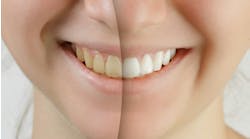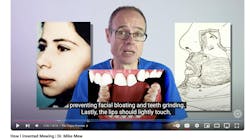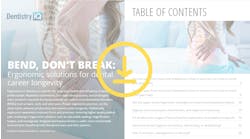Surprise: Dental professionals fared better than average for anxiety, depression during pandemic
No doubt, the dental profession has seen an uptick in depression and anxiety since the onset of the pandemic. New research indicates that not only have rates of depression and anxiety peaked (and receded); but also that at the height of the pandemic, dental professionals had somewhat lower rates of depression and anxiety than general public—despite having been on the front lines during the pandemic’s early days.
That finding was one gathered from a one-year study conducted by the American Dental Association (ADA) and American Dental Hygienists’ Association (ADHA) between September 2020 and August 2021 with a panel of some 8,900 dental health-care workers. The study, believed to be the first of its kind in the US, was part of ongoing collaborative research efforts between the associations to understand COVID-19’s impact on dental health-care workers.
Published in the Journal of the American Dental Association and the Journal of Dental Hygiene, the research also indicates that dental hygienists had higher rates of depression and anxiety than dentists overall. Depression symptom rates peaked in December 2020 and declined in 2021. At the end of the study period, dentists and hygienists had similar rates of depression: 11.8% and 12.4% respectively.
Interestingly, “dental health care workers reported lower rates of anxiety and depression symptoms than the general public, despite being on the front lines and providing oral health care during the pandemic,” said author Stacey Dershewitz, JD, PsyD, in an ADA news brief on the research.
As for the difference in rates of depression and anxiety among dental professionals and the general public, in an email to DentistryIQ, study author Maria L. Geisinger, DDS, MS, said that only the symptoms—and not the reasons behind them—were captured in this research.
“In general, these findings may be related to overall demographic differences between dental health-care workers and the general population and/or the comfort level of dental health-care workers with enhanced infection control practices,” she added.
Vaccines and mental health
As of August 2021, 75.4% of hygienists had been fully vaccinated against COVID-19, a higher percentage than health-care workers overall outside of dentistry at that time. The new study—also the first to examine the association between the COVID-19 vaccine and mental health—found that unvaccinated dental health care workers who intended to be vaccinated suffered significantly more anxiety symptoms compared to their fully vaccinated counterparts.
According to Geisinger, between January and March 2021, the study found that people who planned to get vaccinated but were not yet experienced higher rates of anxiety and depression symptoms (20.6% anxiety, 14% depression), adding, “We did not see this in people who were unvaccinated and did not plan to be, as they did not report higher rates of anxiety and depression symptoms (12.6% anxiety, 11.3% depression).”
While, again, the reasons behind reported symptoms and vaccination were not tracked as part of the study, Geisinger said that concerns around vaccine mandates may still not have surfaced, as the study concluded in spring 2021 and national conversations regarding vaccine mandates and vaccine booster recommendation began later in the year.






